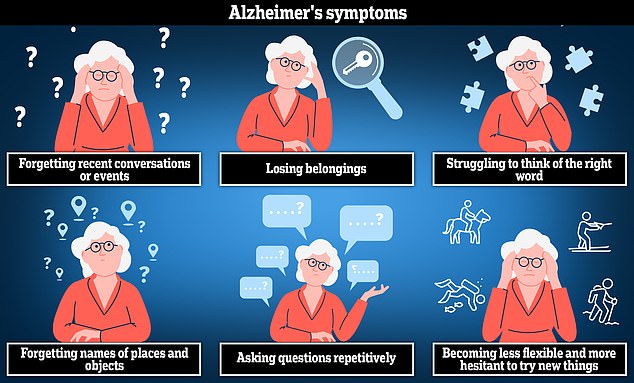How Alzheimer’s disease could be diagnosed ten years earlier after large-scale research into blood proteins
Alzheimer’s disease could be diagnosed a decade earlier following the launch of the world’s largest study of proteins in the body.
Researchers believe a simple blood test can identify people who are in the early stages of Alzheimer’s disease and spot cancer seven years before the disease would otherwise be diagnosed.
This ‘new era of possibilities’ is within reach, experts say, because for the first time it is possible to quickly and cheaply analyze thousands of proteins in the body that change when we get sick.
Scientists will start examining the proteins of half a million volunteers from the UK Biobank’s large-scale health study, which follows people from middle to old age.
Professor Sir Rory Collins, who leads the research and is CEO of UK Biobank, said: ‘Proteins show us what happens in the body in every disease people get.
‘For example, if we can identify people at high risk of heart attacks and strokes based on the proteins in their bodies, doctors could give them statins at a young age – not from their 50s and 60s as is currently the case – so that the drugs will hopefully prevent them from developing. have a heart attack or stroke.
‘If proteins can tell us who is at high risk for breast cancer or colon cancer, they can be offered mammograms or bowel examinations at a younger age, so that cancer is detected early.
‘Importantly, a blood test for proteins can also detect dementia, cancer and other diseases at their early stages and lead to better medicines to treat them.’
Alzheimer’s disease could be diagnosed a decade earlier after the launch of the world’s largest study of proteins in the body (stock photo)

Researchers believe a simple blood test could identify people who are in the early stages of Alzheimer’s disease and spot cancer seven years before it would otherwise be diagnosed (stock photo)
A study of more than 52,000 British Biobank volunteers last year found two proteins in the blood that signal early signs of dementia, a decade before people are diagnosed.
People in the British Biobank study have their blood taken every few years and all their diseases are recorded.
More than 100 of these volunteers who developed cancer showed signs of the disease in their blood more than seven years earlier, an analysis led by the University of Oxford reported last year.
That suggests that looking at people’s proteins seven years earlier could make them develop cancer.
As the world’s largest protein study gets underway, new insights are expected for many more diseases, including less common cancers.
Proteins will also play an important role in better understanding diseases.
Initial findings show that type 2 diabetes is not really one disease for all. Some people may have more inflammation in their bodies, and some may be worse at regulating their blood sugar levels. Therefore, people can benefit from various medications that target exactly what has gone wrong in their blood sugar levels. body.
Proteins also illustrate that there are different types of depression, which require different treatment.
The vast database of people and their proteins could also reveal how much our genes, and how much our unhealthy lifestyles, contribute to various diseases that strike later in life.

Alzheimer’s disease is the most common cause of dementia. The disease can cause anxiety, confusion and short-term memory loss
For example, if proteins associated with a type of cancer change more in people on a certain diet than in people at genetic risk, that shows that what we eat is very important in causing that cancer.
Experts hope the new study will lead to drugs that target and reduce harmful proteins, helping people stay healthier for longer.
Science Secretary Lord Patrick Vallance said: ‘UK Biobank is an extraordinary resource for medical research and has already had a major impact on diagnosis and treatments.
‘The plan to study proteins in study participants has the potential to unlock a new era of possibilities.’
The study will measure up to 5,400 proteins in each person, starting with a quarter of a million blood samples from volunteers at the UK Biobank – and 50,000 from some volunteers who provided another blood sample 10 to 15 years later.
That will show how proteins change as people get older and they are more likely to get sick.
Researchers say proteins can provide early warning for 90 percent of diseases studied so far, which is better than existing methods.
Protein will accelerate the development of drugs for breast cancer, cardiovascular disease and Parkinson’s disease, based on early findings, and 14 leading pharmaceutical companies support the new study.
